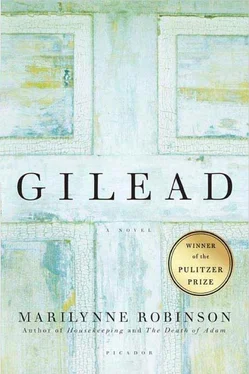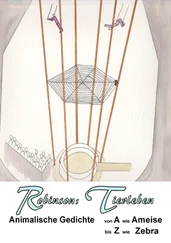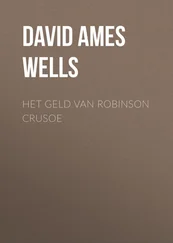One after another, when those women learned they were widows, they went back to their families in the East. Not all of them, but a good many. Some of them had buried their husbands and their children beside the church, so they felt they couldn’t leave. And some of those who left came back, even years later. Still, that congregation dwindled away finally, and the Methodists bought the land and burned the old building down because it was past saving.
***
My father spoke once in a sermon about how he regretted the times after the war that he’d gone off to sit with the Quakers while his father struggled to find words of comfort to say to his poor remnant of a flock. He said in those days his father opened all the windows that still would open, so they could hear the Methodists singing by the river, and that some of the women would join in if the song was “The Old Rugged Cross” or “Rock of Ages,” even in the middle of the sermon, and he’d just stop preaching and listen to them. The wind, he said, smelled like turned earth because of the new graves, and yet people afterward remembered those Sunday mornings and those Wednesday evenings as something strangely wonderful. There was a tenderness in the way they told about them. My father said he had regretted and repented his whole life since that time but never sufficiently, because at first staying away had seemed an act of principle almost. His father had preached his people into the war, saying while there was slavery there was no peace, but only a war of the armed and powerful against the captive and defenseless. He would say, Peace will come only when that war ends, so the God of peace calls upon us to end it. He said all this with that gun in his belt. And everyone there always shouted amen, even the littlest children. I came home for lunch today and found you playing catch in the street with Jack Boughton. You had his mitt, a fine new fielder’s mitt that reached almost to your elbow, and he had that old glove of Edward’s that I keep on my desk. No webbing at all, no pocket to speak of. It’s an oversight of mine that I haven’t gotten you a glove of your own. I’ll see to that.
Young Boughton was teaching you to scoop up grounders, probably to cover for the fact that you weren’t likely to actually catch anything on the fly. You were being very earnest about it all, running hither and thither on those clever child legs of yours, and he was saying, “Come on, come on,” and pounding his glove, and then, in a sportscaster’s voice, “He’s rounding second, folks. Will the throw be in time?” And you would lose the ball again, and he would say, “This is amazing, folks. The runner appears to have tripped on his shoelace! He’s down! He’s taking a while to catch his breath! Now he’s up, he’s headed for the plate!” He would say, “He’s dragging his left leg, folks, he’s hopping on one foot!” And by then you were giggling considerably, but you got the ball to him finally, and he said, “Well, folks, that runner’s out!” It was beautiful to watch you two in the flickering shade.
I remember watching Louisa skipping rope in that street in a bright red coat with her pigtails jumping in the cold. It was early spring, so she didn’t raise any dust to speak of. The trees were just budding their leaves. They still had that slight, brave look young trees have. I don’t know whose idea it was to plant all these elms around town, but whoever it was did us a world of good. Old Boughton and I used to toss the ball of an evening under those same trees, till his joints began to bother him, which was before he was into his forties, as I recall. His health has been another great trial for him. This Jack Boughton could be his father, to look at him.
I’m trying to make the best of our situation. That is, I’m trying to tell you things I might never have thought to tell you if I had brought you up myself, father and son, in the usual companionable way. When things are taking their ordinary course, it is hard to remember what matters. There are so many things you would never think to tell anyone. And I believe they may be the things that mean most to you, and that even your own child would have to know in order to know you well at all. I remember that day in my childhood when I lay under the wagon with the other little children, watching them pull down the ruins of that Baptist church, and my father brought me a piece of biscuit for my lunch, and I crawled out and knelt with him there, in the rain. I remember it as if he broke the bread and put a bit of it in my mouth, though I know he didn’t. His hands and his face were black with ash he looked charred, like one of the old martyrs — and he knelt there in the rain and brought a piece of biscuit out from inside his shirt, and he did break it, that’s true, and gave half to me and ate the other half himself. And it truly was the bread of affliction, because everyone was poor then. There had been drought for a few years and times were hard. Though we didn’t notice it so much when they were hard for everybody. And I guess that must have been why no one minded the rain. There had been so little of it. One thing I do always remember is how the women let their hair fall down and their skirts trail in the mud, even the old women, as if none of it mattered at all. And then the singing, which was very beautiful as I remember it, though I’m pretty sure it could not have been. It would just rise up with the sound of the rain. “Beneath the Cross of Jesus.” All the lovely, sad old tunes. The bitterness of that morsel has meant other things to me as the years passed. I have had many occasions to reflect on it.
It is not surprising that I remember that day as if my father had given me communion, taking that bread from his side and breaking it for me with his ashy hands. But it is strange that I remember receiving it the way I do, since it has never been our custom for the minister to place the bread in the communicant’s mouth, as they do in some churches. I think of this because, on the morning of communion when your mother brought you forward and said, “You ought to give him some of that,” I broke the bread and fed a bit of it to you from my hand, just the way my father would not have done except in my memory. And I know what I wanted in that moment was to give you some version of that same memory, which has been very dear to me, though only now do I realize how often it has been in my mind.
Time, like an ever-rolling stream, Bears all its sons away;
They fly forgotten, as a dream Dies at the opening day.
Good old Isaac Watts. I’ve thought about that verse often. I have always wondered what relationship this present reality bears to an ultimate reality.
A thousand ages in Thy sight
Are like ah evening gone …
No doubt that is true. Our dream of life will end as dreams do end, abruptly and completely, when the sun rises, when the light comes. And we will think, All that fear and all that grief were about nothing. But that cannot be true. I can’t believe we will forget our sorrows altogether. That would mean forgetting that we had lived, humanly speaking. Sorrow seems to me to be a great part of the substance of human life. For example, at this very moment I feel a kind of loving grief for you as you read this, because I do not know you, and because you have grown up fatherless, you poor child, lying on your belly now in the sun with Soapy asleep on the small of your back. You are drawing those terrible little pictures that you will bring me to admire, and which I will admire because I have not the heart to say one word that you might remember against me.
I will tell you some more old stories. So much of what I know about those old days comes from the time my father and I spent wandering around together lost in Kansas. I don’t know if I ever actually cried, but I know I spent a lot of time trying not to. The soles of my shoes wore through and the dust and sticks and gravel came in and wore out my socks and got to work on my feet. O the filth! O the blisters! Time weighs on children. They struggle just to get through church, as you know. And there I was, trudging through the same old nowhere, day after day, always wanting to slow down, to sit down, to lie down, with my father walking on ahead, no doubt a little desperate, as he had every right to be. Once or twice I did sit down. I just sat there in the heat and the weeds with the grasshoppers flying around my head and watched him walk away, and he’d keep walking till he was almost out of my sight, which is a long way in Kansas. Then I’d go running to catch up. He’d say, “You’re going to make yourself thirsty.” Well, it seemed to me I’d been thirsty half my life.
Читать дальше












